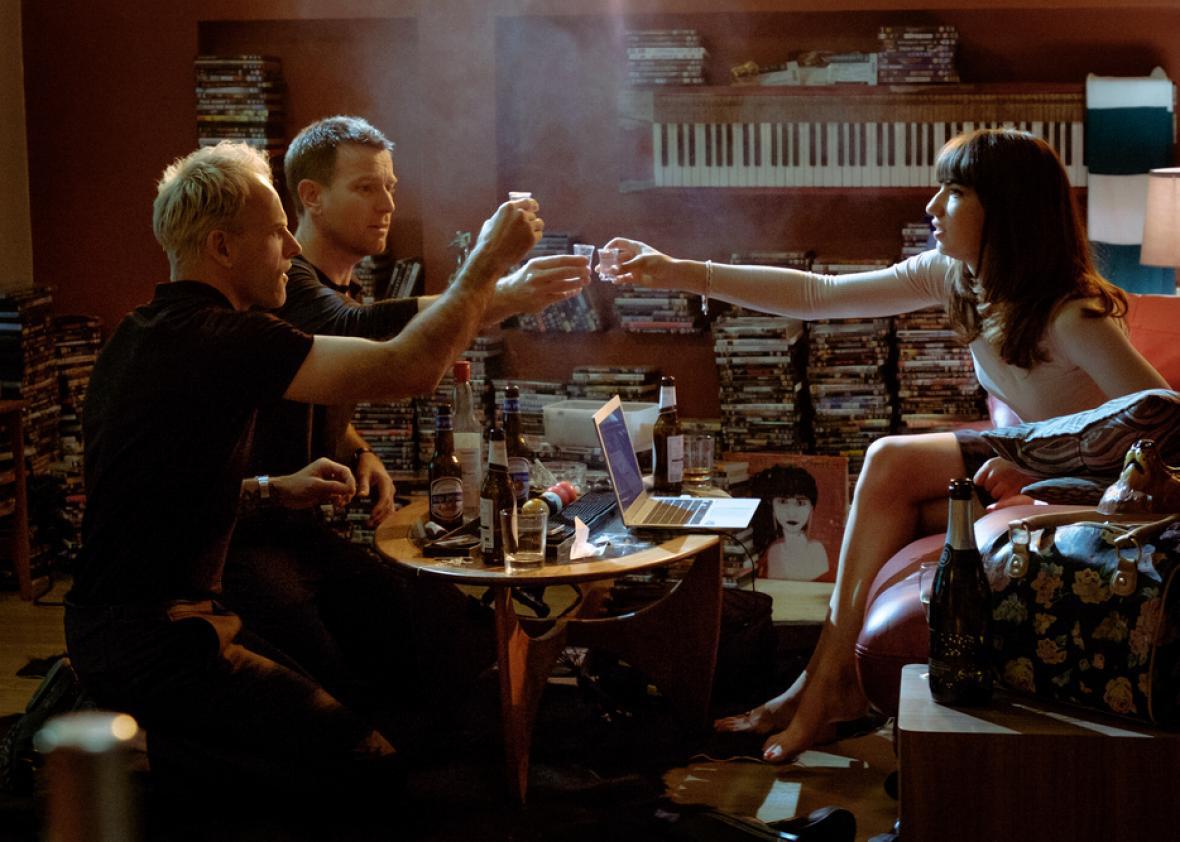The original Trainspotting’s most famous scene is its “Choose Life” monologue, in which Renton (Ewan McGregor) rattles off a compendium of symbols of mindless Western consumerism: “Choose washing machines, cars, compact disc players, and electrical tin-can openers.” It’s about as explicitly political as Danny Boyle’s film gets and the closest it really comes to the spirit of the novel of the same name by Irvine Welsh. Boyle’s Trainspotting sequel, T2, gives that same monologue an update for 2017, urging us to choose Facebook, slut-shaming, and zero-hour contracts instead, making a point that very little has changed. Boyle seems to want this to be this movie’s political manifesto, the same kind of commentary on modern life that we saw from the original.
Instead, that monologue is upstaged by a scene that occurs earlier in the film, in which Renton and Sick Boy (Jonny Lee Miller) have traveled to West Scotland to worm their way into a Protestant pub where they intend to steal the patrons’ bank cards. And while the duo successfully manage to rifle through pockets, purses, and wallets undetected, they’re prevented from leaving with their prizes by an intimidating bouncer who suggests that the boys “give us a song.” A nervous Renton takes the mic, and, accompanied by Simon on piano, improvises one:
It was on the field of battle
Of hope we were bereft
And by the time that it was over
There were no more Catholics left.
There’s a long, very pregnant pause in which the patrons stare blankly, evidently in disbelief. For a moment, Renton and Simon look like they’re done for. But then, just as the pair are ready to bolt, the crowd goes nuts, cheering and shouting. In fact, they love it so much so that Renton improvises several more verses, all of which conclude with that same line. (Turns out there are a lot of words that rhyme with left.) By the end, all aspirations to rhyme have been dropped, leaving only the euphoric chant of “No more Catholics!”
Even without much context, this comic set piece is the funniest in the movie, creating a moment of genuine danger for Renton and Simon before producing a surprising payoff. But to American audiences, it might also feel a little bit random, because to fully appreciate the scene’s layers and sociopolitcal resonance you have to know a little something about Scottish sectarianism, the Catholic vs. Protestant religious and political conflict that dates back to the Protestant Reformation. Today, that animosity mainly manifests itself as a fanatical sports rivalry between two of Scotland’s Premiere League soccer clubs: the Glasgow Rangers (historically the team of choice for Protestant Unionists), and Celtic (which has its origins in Scotland’s immigrant Irish, and therefore Catholic, population). And that’s key to understanding T2’s most political scene.
Boyle lays the groundwork for the set piece as Renton and Simon prepare for the job in the car outside the nondescript, remote club, using markers to give themself fake tattoos that read “1690.” Renton explains to Veronika, Simon’s Bulgarian girlfriend, what they’re about to encounter inside the building. “These are people who’ve been abandoned by their political class,” he says. “But at least they have a sense of identity.”
That identity is not, as we might expect, that of the working poor, gangs, or some other underclass of the United Kingdom. Instead, they’re the rabid, Irish Catholic–hating Protestant Unionists, whose outdated beliefs, Renton notes, have left them relics of the past in their now secular, progressive country. In the club’s interior, even before the camera cuts to the hilariously unsubtle William of Orange–inspired décor and removes all doubt, our first glimpse of the revelers is of a group singing “Penny Arcade,” the 1969 song popularized by Roy Orbison that has since become a Rangers (and by association, Unionist) anthem. The song makes the building instantly recognizable—for Scots at least—for what it is: a Loyalist Club, one hostile to Scotland’s Irish-descended Catholic minoriy.
What follows—the song, the roaring crowd—is a brilliant, comically exaggerated scene that hits on a problem that Scotland still hasn’t managed to shake to this day. Even in 2017, sectarianism is still an issue, mostly in and around Glasgow, where some pubs have to close up entirely during soccer games to prevent brawling. But the corresponding passage in Porno, the Welsh novel on which T2 is very loosely based, has none of the unbridled joy that Boyle’s version does. (In the novel, Simon merely ferrets out the account information of Rangers ticketholders through some dodgy means, with none of the infiltration or singing.) And the sharp satirical quality of the scene makes it one of the most political in the movie, expressing both disdain and a kind of weird sympathy for these retrograde holdouts, people who, like the heroin addicts of the original film, just don’t seem to have a place in modern society. As my colleague June Thomas noted in her review of the film for Slate, Boyle wisely plays this scene “for laughs rather than censorious tut-tutting.”
And yet the Unionists do get their well-deserved comeuppance before long—as they’re caught up in their anti-Catholic fervor, Renton and Simon make a speedy getaway with the ATM cards, and since the Rangers fans nearly all have the same PIN (1690, the year of the Battle of the Boyne and Protestant victory over James II), there is no difficulty in robbing them blind. As much as Boyle might want us to leave the theater mulling over our culture of Facebook, slut-shaming, and zero-hour contracts, I for one left the theater humming Renton’s little tune. And I’m one of those stinking Catholics.
